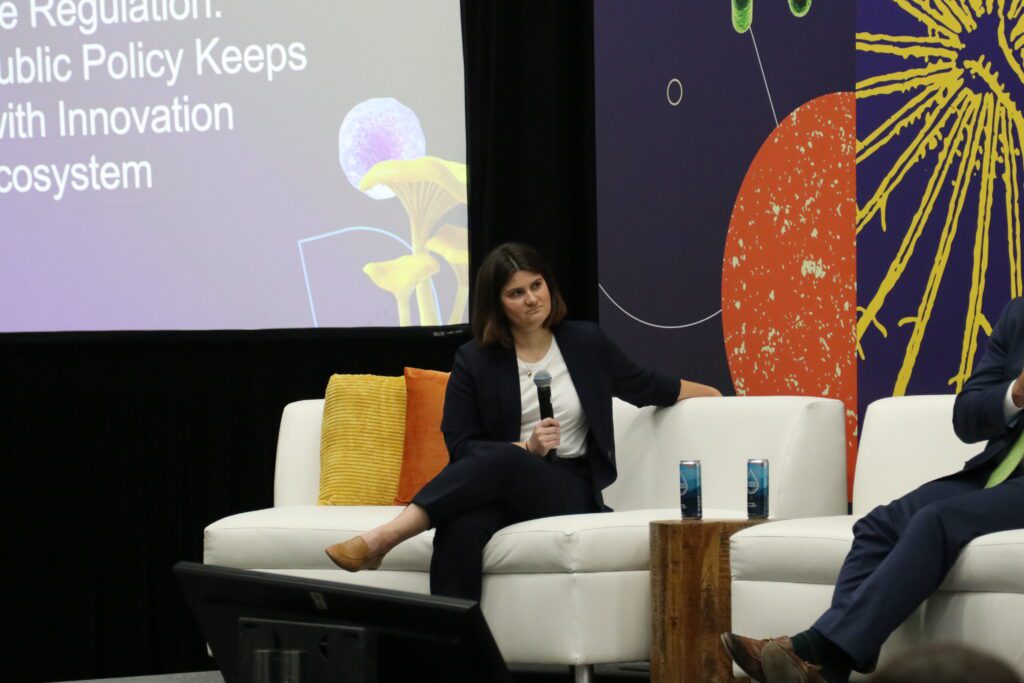With rapid innovations in agriculture, energy, and environmental biotech, the industry must try to educate regulators and the public about the latest scientific advances and their benefits, said experts in a June 5 panel at the BIO International Convention in San Diego.
While scientific discoveries will always outpace regulation, the panelists explained how their companies’ innovations in sustainable food and energy production have a better chance of obtaining investment and reaching the market if the time and complexity of regulation can be reduced.
“For biotechnology products like those that are represented up here on the dais, more than one agency has jurisdiction over a single product at different points in the value chain,” said Tad Sonstegard, Ph.D., a BIO Board Member and CEO of Acceligen, which is developing animals resistant to heat and disease. This can lead to delays that impact the return on investment.
“The onus actually may be on us—and other stakeholder groups and like-minded developers, communicators, and advocators—to communicate to our policymakers the need for updated regulatory and policy paradigms,” Sonstegard said.
The challenges with current regulations

When describing the challenge of bringing regulation up to date, Cameron Bishop, head of the Washington office for J.R. Simplot Company, which develops crops with longer shelf lives, said regulation is still based on the Food and Drug and Cosmetic Act of 1938. Of course, the law has been updated and amended many times since then, but the rules still go back to outdated roots, he said.
For sustainable aviation fuel (SAF), regulation has focused on specifics like “lists of eligible feedstocks or prioritizing one conversion technology over others,” said Emily Carlton, SAF Policy Specialist at LanzaJet. Instead, she recommended “rigorous, science-based” regulation that is feedstock- and technology-neutral, focusing on total carbon emissions over a product’s lifecycle.
Sonstegard’s company Acceligen produces slick-coat cattle, which are better able to withstand the heat brought on by climate change. In 2022, the cattle became the first gene-edited food animal to receive a “low-risk determination” from the U.S. Food and Drug Administration (FDA). However, other countries follow the more streamlined Cartagena Protocol for biotech regulation, which allows innovation to come to market much faster, he said.
Education is key to advancing biotech innovation
The key to encouraging streamlined regulation is educating others about the science behind your innovation, the panelists agreed.
“You need to interact with the regulators, and you need to interact with the legislators,” Bishop stressed.
“Even if you don’t think you have anything to say, go to D.C. and educate them on what you do” and make lawmakers comfortable with complex topics, he explained. That way, when the topic comes up again, they’ll remember it and be ready to address it.
According to Carlton, the people who need to be taught are all over the government. For example, the Treasury Department updated its measurement of lifecycle emissions, benefiting SAF makers when it comes to receiving tax credits. However, the Environmental Protection Agency (EPA), which has regulatory authority, is not as advanced on the subject.
Watch our interview with Emily Carlton, SAF Policy Specialist at LanzaJet
‘Four corners of regulation’
“You’ve got four corners of regulation,” added Bishop. “You’ve got your innovators; you’ve got your regulators; you also have your detractors; and then you have public perception.”
He noted that detractors frequently oppose innovation without any scientific basis. However, they can organize and have a heavy impact on public comment periods for new regulations. Therefore, it’s important to ensure that regulators and the public are well informed about innovation to counter the impact of detractors.
The public can also be an important ally in calling for expedited regulatory change. For example, consumer sentiment on SAF is quite positive.
Don’t forget regulators in other countries, who impact how easy it is to export products, and suppliers, who impact where innovations are sold.
“Did you know, Whole Foods is not allowed to sell clones?” Sonstegard asked. “Some of these policies are really based on science fiction and not science.”
Header Image: Emily Carlton, SAF Policy Specialist at LanzaJet, at the 2024 BIO International Convention in San Diego.




